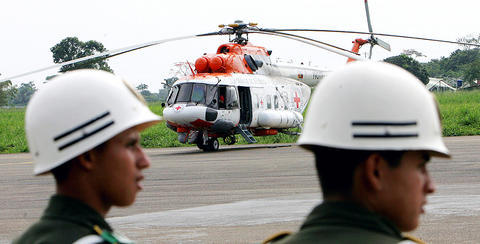A Venezuelan-led mission to rescue three hostages held by leftist rebels in Colombia's jungles was on the verge of collapse on Monday, with the guerrillas telling Venezuelan President Hugo Chavez that Colombia's military was preventing the handoff.
Colombian President Alvaro Uribe dismissed the claim as a lie by the Revolutionary Armed Forces of Colombia (FARC) saying his government would permit a cease-fire corridor to let the rebels turn over the hostages.
"The FARC terrorist group doesn't have any excuse. They've fooled Colombia and now they want to fool the international community," Uribe said from the central Colombian city where Venezuela helicopters have been waiting since Friday for word from the guerrillas on where the hostages could be picked up.

PHOTO: AFP
Uribe raised the possibility that one of the hostages, a boy thought to be three years old and fathered by a guerrilla, could have turned up in Bogota.
The Colombian leader said only DNA tests were required to prove or disprove "this hypothesis" -- which he said could be done as soon as the boy's grandmother returns from Caracas, where she has been waiting for the release of her daughter, Clara Rojas, and grandson Emmanuel.
MESSAGE
Chavez said he received a message from FARC on Monday saying Colombian military operations were preventing them from freeing three hostages they had agreed to turn over to Chavez -- including the boy, Rojas and former congresswoman Consuelo Gonzalez.
Speaking on Venezuelan state TV, Chavez said the rebels wrote in a letter that "the military operational attempts in the zone impede us for now from turning over" the three hostages.
'ANOTHER OPTION'
Venezuela and FARC could consider "another option, a clandestine option" to evade Colombian patrols and turn over the hostages, Chavez said, adding that such a mission could be "extremely risky."
Alternately, Chavez said that "a ceasefire could open some doors."
FARC, in the letter read by Chavez and dated Sunday, said that "insisting on [a handover] in these conditions would be putting at risk" the lives of hostages and guerrillas sent to turn them over.
"FARC lies. The Colombian government keeps its word," Uribe said.
Uribe last month abruptly ended Chavez' efforts to broker a wider swap of 44 high-profile hostages -- including three US defense contractors and former Colombian presidential candidate Ingrid Betancourt -- for hundreds of jailed rebels.
But hostages' relatives have urged the leftist leader on, saying he was the only intermediary capable of breaking a government-rebel deadlock.
The two sides have not held face-to-face talks since Uribe took power in 2002.
The US-allied Uribe has instead used some US$600 million in annual military and intelligence aid from Washington to push the half-century-old insurgency deeper into the jungle.
Also See: Venezuela launches new currency in face of inflation

DOUBLE-MURDER CASE: The officer told the dispatcher he would check the locations of the callers, but instead headed to a pizzeria, remaining there for about an hour A New Jersey officer has been charged with misconduct after prosecutors said he did not quickly respond to and properly investigate reports of a shooting that turned out to be a double murder, instead allegedly stopping at an ATM and pizzeria. Franklin Township Police Sergeant Kevin Bollaro was the on-duty officer on the evening of Aug. 1, when police received 911 calls reporting gunshots and screaming in Pittstown, about 96km from Manhattan in central New Jersey, Hunterdon County Prosecutor Renee Robeson’s office said. However, rather than responding immediately, prosecutors said GPS data and surveillance video showed Bollaro drove about 3km

‘MOTHER’ OF THAILAND: In her glamorous heyday in the 1960s, former Thai queen Sirikit mingled with US presidents and superstars such as Elvis Presley The year-long funeral ceremony of former Thai queen Sirikit started yesterday, with grieving royalists set to salute the procession bringing her body to lie in state at Bangkok’s Grand Palace. Members of the royal family are venerated in Thailand, treated by many as semi-divine figures, and lavished with glowing media coverage and gold-adorned portraits hanging in public spaces and private homes nationwide. Sirikit, the mother of Thai King Vajiralongkorn and widow of the nation’s longest-reigning monarch, died late on Friday at the age of 93. Black-and-white tributes to the royal matriarch are being beamed onto towering digital advertizing billboards, on

Tens of thousands of people on Saturday took to the streets of Spain’s eastern city of Valencia to mark the first anniversary of floods that killed 229 people and to denounce the handling of the disaster. Demonstrators, many carrying photos of the victims, called on regional government head Carlos Mazon to resign over what they said was the slow response to one of Europe’s deadliest natural disasters in decades. “People are still really angry,” said Rosa Cerros, a 42-year-old government worker who took part with her husband and two young daughters. “Why weren’t people evacuated? Its incomprehensible,” she said. Mazon’s

POWER ABUSE WORRY: Some people warned that the broad language of the treaty could lead to overreach by authorities and enable the repression of government critics Countries signed their first UN treaty targeting cybercrime in Hanoi yesterday, despite opposition from an unlikely band of tech companies and rights groups warning of expanded state surveillance. The new global legal framework aims to bolster international cooperation to fight digital crimes, from child pornography to transnational cyberscams and money laundering. More than 60 countries signed the declaration, which means it would go into force once ratified by those states. UN Secretary-General Antonio Guterres described the signing as an “important milestone,” and that it was “only the beginning.” “Every day, sophisticated scams destroy families, steal migrants and drain billions of dollars from our economy...